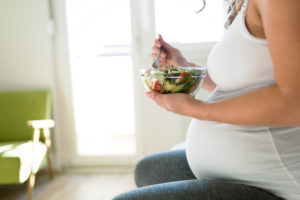
What happens to your body after giving birth? Even though you have undergone hormonal changes during pregnancy, take a look at what birth mothers need to know about the physical changes that happen after childbirth, even if you choose to give your baby up for adoption.
Does Your Body Go Back to Normal Right Away?
It takes about nine months for your body to change as you prepare for child delivery. After giving birth, your body won’t take another nine months to return to its pre-pregnancy state, but this doesn’t mean it will snap back to normal immediately. Instead, some changes will happen right away, while others may take some time.
The physical changes that happen after giving birth depend on the delivery method. It is typically easier to recover after a natural delivery compared to a C-section.
As your uterus begins to shrink back to its pre-pregnancy size, you may feel some cramping or discomfort. These pains may also happen as your body tries to stop post-delivery bleeding where the placenta was attached to the inside of the uterus. It can take up to six weeks for your uterus to shrink down to its regular size.
Immediately after giving birth, you will notice a vaginal discharge called lochia. According to the Cleveland Clinic, lochia may have a dark red color for the first three days after delivery. Over the next week and a half, lochia should gradually become more of a pink or brown color. It should then turn into a yellow or cream-colored discharge before it stops completely.
Some women will have an increased lochia flow when they are active or exercising. However, lochia and post-delivery bleeding usually stops four to six weeks after delivery.
Along with lochia, you may notice some post-pregnancy nipple discharge and breast engorgement. Even though you may not be nursing, your body will still produce milk. You may need to pump or apply warm compresses to reduce engorgement discomfort.
If you choose to pump, your milk may not dry up as quickly. Some women, who produce milk but don’t need to feed a baby due to giving them up for adoption, donate the breast milk to a milk bank. If this is a process you feel comfortable with or want to explore, talk to your medical provider or social worker about the various options.
Will You Have Pain After Childbirth?
You may have cramping or discomfort in your pelvic area as your uterus tries to return to its normal size. You may also have breast tenderness during the postpartum period. Some women also experience perineal discomfort after a natural delivery, especially if the area tore or was surgically cut and stitched during delivery. The perinea is the area between the vagina and the anus.
Talk to your doctor or other medical provider about how to manage postpartum perineal pain. Sitz baths and some topical treatments can alleviate discomfort. As your body heals, you will notice a decrease in perineal pain.
When Will You Have a Period?
Lochia is not your normal period. While you will bleed after delivery, this isn’t a menstrual cycle. According to the U.S. Department of Health and Human Services Office on Women’s Health, you could have your first post-pregnancy period six to eight weeks postpartum. If you don’t pump, you may get your period sooner.
Can You Get Pregnant Again After Giving Birth?
You can get pregnant again in the weeks or months after giving birth. It is possible to get pregnant before your first post-delivery period because you will ovulate before you start to bleed. If the egg you ovulate is fertilized, you could get pregnant, whether you’ve had a period yet or not. A birth control method or abstinence can reduce the risks of another pregnancy.
Discuss the best options for your situation with a healthcare provider after delivery as soon as possible. If there is any chance that you will be sexually active, you should not wait until your six-week postpartum checkup to think about the next steps.
How Soon Can You Go Back to School or Work?
When will you feel physically ready to return to your regular pre-pregnancy routine? There is no specific date or time frame that works for every birth mother. If your pregnancy and delivery were complication-free, it’s possible that you could feel well enough to return to school or work within a few weeks, provided your job doesn’t require heavy lifting or other manual labor or require you to stand for hours at a time.
You may need to take more time off to rest and recover after a C-section. Your doctor or other medical provider will help you to make a decision based on your overall healthcare needs.
Do you want to learn more about adoption and the birth mother experience? Contact Arizona Adoption Help for more information.



